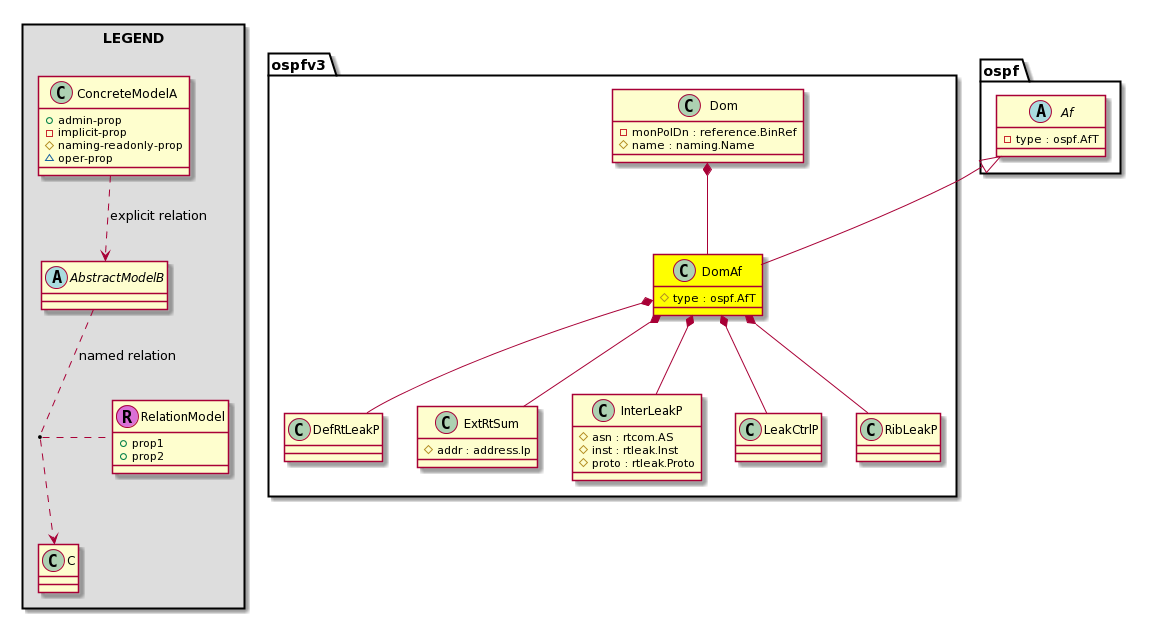
Super Mo: ospf:Af,
Container Mos: ospfv3:Dom (deletable:no),
Contained Mos: ospfv3:DefRtLeakP, ospfv3:ExtRtSum, ospfv3:InterLeakP, ospfv3:LeakCtrlP, ospfv3:RibLeakP,
|
||||||||||||
| Naming Rules | |
RN FORMAT: domaf-{type}
[1] PREFIX=domaf- PROPERTY = type
DN FORMAT:
[0] topology/pod-{id}/node-{id}/sys/ospfv3/inst-{name}/dom-{name}/domaf-{type}
[1] sys/ospfv3/inst-{name}/dom-{name}/domaf-{type}
|
|
| Diagram | |

Super Mo: ospf:Af, Container Mos: ospfv3:Dom (deletable:no), Contained Mos: ospfv3:DefRtLeakP, ospfv3:ExtRtSum, ospfv3:InterLeakP, ospfv3:LeakCtrlP, ospfv3:RibLeakP, |
|
| Containers Hierarchies | |||||||||||||||||||||||||||||||||||||||||||||||||||||||||||||||||||||||||||||||||
|
|||||||||||||||||||||||||||||||||||||||||||||||||||||||||||||||||||||||||||||||||
| Contained Hierarchy | |||||||||||||||||||||||||||||||||
|
|||||||||||||||||||||||||||||||||
| Inheritance | ||||||||||||||||||||||||||||||||||||||||||||
|
||||||||||||||||||||||||||||||||||||||||||||
| Events | |
|
|
| Faults | |
|
|
| Fsms | |
|
|
| Properties Summary | ||||||||||||
| Defined in: ospfv3:DomAf | |
|
ospf:AfT
scalar:Enum8 |
type (ospfv3:DomAf:type) Overrides:ospf:Af:type The specific type of the object or component. |
| Defined in: nw:CpDom | |
|
naming:Name
string:Basic |
name (nw:CpDom:name) Overrides:nw:Conn:name The name of the object. |
| Defined in: mo:Resolvable | |
|
mo:Owner
scalar:Enum8 |
lcOwn (mo:Resolvable:lcOwn) A value that indicates how this object was created. For internal use only. |
| Defined in: mo:TopProps | |
|
mo:ModificationChildAction
scalar:Bitmask32 |
childAction (mo:TopProps:childAction) Delete or ignore. For internal use only. |
| reference:BinRef |
dn (mo:TopProps:dn) A tag or metadata is a non-hierarchical keyword or term assigned to the fabric module. |
| reference:BinRN |
rn (mo:TopProps:rn) Identifies an object from its siblings within the context of its parent object. The distinguished name contains a sequence of relative names. |
|
mo:ModificationStatus
scalar:Bitmask32 |
status (mo:TopProps:status) The upgrade status. This property is for internal use only. |
| Defined in: mo:Modifiable | |
|
mo:TStamp
scalar:Date |
modTs (mo:Modifiable:modTs) The time when this object was last modified. |
| Properties Detail |
Type: mo:ModificationChildAction Primitive Type: scalar:Bitmask32 Units: null Encrypted: false Access: implicit Category: TopLevelChildActionComments:
| |||
Type: reference:BinRef Units: null Encrypted: false Access: implicit Category: TopLevelDnComments:
Type: mo:Owner Primitive Type: scalar:Enum8 Units: null Encrypted: false Access: implicit Category: TopLevelRegularComments:
| |||
Type: mo:TStamp Primitive Type: scalar:Date Units: null Encrypted: false Access: implicit Category: TopLevelRegularComments:
| |||
Type: naming:Name Primitive Type: string:Basic Overrides:nw:Conn:name Units: null Encrypted: false Access: admin Category: TopLevelRegularComments:
Type: reference:BinRN Units: null Encrypted: false Access: implicit Category: TopLevelRnComments:
Type: mo:ModificationStatus Primitive Type: scalar:Bitmask32 Units: null Encrypted: false Access: implicit Category: TopLevelStatusComments:
| |||
Type: ospf:AfT Primitive Type: scalar:Enum8 Overrides:ospf:Af:type Units: null Encrypted: false Naming Property -- [NAMING RULES] Access: naming Category: TopLevelRegularComments:
| |||
|
||||||||||||